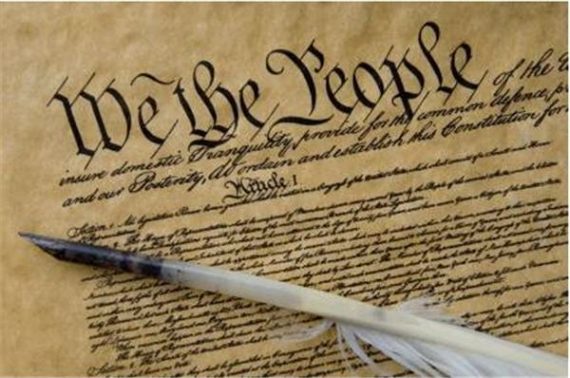Which Branch Of Government Gets To Decide If Jerusalem Is In Israel?
Last July, I made note of a case that the Supreme Court had accepted for appeal which involved the question of whether the State Department could be forced by Congress to recognize, on an American passport, that Jerusalem is the capital of Israel, something that the United State still does not officially recognize given the competing claims resulting from the 1967 War. Today, the Supreme Court rejected the arguments made by lower courts that the judiciary cannot involve itself in this matter and ordered that the matter be decided on the merits, specifically the question of whether the law that purports to compel the Executive to do this is unconstitutional:
WASHINGTON — The Supreme Court ruled Monday that the federal courts should decide whether a law that would allow Jerusalem-born Americans to list Israel as their birthplace on their U.S. passport passes constitutional muster.
The justices, on an 8-1 judgment, overturned a lower court ruling that said the judiciary could not get involved in a political fight mixing Middle Eastern politics with a dispute between Congress and the president.
“The courts are fully capable of determining whether this statute may be given effect, or instead must be struck down in light of authority conferred on the executive by the Constitution,” said Chief Justice John Roberts, who wrote the majority opinion.
But because the lower courts never actually ruled on the merits of the law giving Americans born in Jerusalem the right to have Israel listed as their birthplace — only that judges should not get involved — Roberts said the high court did not have enough facts to determine the law’s constitutionality.
“Ours is a court of final review and not first view,” said Roberts, who sent the case back down to the lower courts for rehearing.
The parents of Jerusalem-born Menachem Zivotofsky sued the State Department after it wouldn’t issue the boy a passport showing he was born in Israel. The United States has refused to recognize any nation’s sovereignty over Jerusalem since Israel’s creation in 1948.
At the time, Jerusalem was divided, with Israel controlling the western part of the city and Jordan holding sway over the eastern sector that includes key Jewish, Muslim and Christian holy sites. Israel captured east Jerusalem from Jordan in the 1967 Mideast war, annexed the area and proclaimed the once-divided city as its capital. The Palestinians claim east Jerusalem as their capital.
The international community does not recognize the Israeli annexation and says the fate of the holy city should be resolved through negotiations.
Congress passed the law seeking to give Americans born there the right to have Israel listed as their birthplace in 2002; but Republican and Democratic administrations have refused to enforce it. The government said the passport policy is in line with longstanding U.S. foreign policy that says the status of Jerusalem should be resolved in negotiations between Israel and the Palestinians.
Justice Stephen Breyer was the only dissenter on the court, saying there is a “serious risk” that judicial “intervention will bring about ’embarrassment,’ show lack of ‘respect’ for the other branches, and potentially disrupt sound foreign policy decision making.”
The U.S. Court of Appeals for the District of Columbia Circuit agreed, saying that the federal judiciary has no authority to consider the matter, which they have labeled a political dispute that is best resolved by the other two branches of government without court involvement.
The Obama administration, like its Republican and Democratic predecessors, says it doesn’t want to stir up anger in the Arab world by appearing to take a position on the ultimate fate of Jerusalem.
But Roberts said the question before the court is not a political one.
“The federal courts are not being asked to supplant a foreign policy decision of the political branches with the courts’ own unmoored determination of what the United States policy toward Jerusalem should be,” Roberts said. “Instead, Zivotofsky requests that the courts enforce a specific statutory right. To resolve his claim, the judiciary must decide if Zivotofsky’s interpretation of the statute is correct, and whether the statute is constitutional. This is a familiar judicial exercise.”
On this narrow issue, this strikes me as the correct decision by the eight justice majority. There’s no reason why the Courts cannot perform their customary duty of ruling on the Constitutionality of statutes simply because this statute happens to concern itself with a controversial foreign policy issue. More importantly, if the Court’s don’t decide this issue then it will be left entirely unresolved and we’ll be left with a political conflict between the Executive and Legislative Branches that could have international implications.
At the same time, the observation I made last summer would still seem to apply:
One could argue, it seems to me, that the power to recognize governments would be covered by the President’s plenary authority over the conduct of foreign affairs. However, the broader question really would be if the President doesn’t have the authority to recognize new governments, then who does? Placing that authority in the hands of Congress when no such power can be found in the confines of Article I makes no sense whatsoever, and the only other argument would be that nobody has such a power, which strikes me as pure nonsense. The fact that nobody in the Founding generation seemed to question Washington’s authority with respect to the recognition of Revolutionary France, argues strongly that it was accepted that this was part of the natural duties of the Chief Executive. In any event, while it’s an interesting academic argument, I find it hard to believe that the Supreme Court would rule that Congress has the authority to tell the President how to conduct foreign affairs.
The idea that Congress can dictate the details of foreign policy to the President and Secretary of State in this manner raises troubling Separation Of Powers issues, not to mention the rather obvious international implications of allowing Congress to exercise this power not just in this case but in future cases.
This case is likely to spend at least another year or two in the District and Circuit Courts before it returns to the Supreme Court, but I think the Justices know that this isn’t the last time they’ll be dealing with this case. Next time, they’ll have to rule on the merits.
Here’s the opinion for those interested:
Zivotovsky v. Clinton, Secretary Of State
Update: Inadvertently embedded to wrong opinion. Fixed now.







“Which Branch Of Government Gets To Decide If Jerusalem Is In Israel?”
In order of sanity, to less sane:
The Executive;
The Legislative;
The Judicial.
BTW Doug, your link is to the transcript of some obscure discussion of something called the Anti Injunction Act. That certainly can’t be newsworthy.
@PD Shaw:
Yea that’s fixed now
I think these matters have to be cleared by Joe Lieberman, the Senior Senator from Israel.
“Which branch of government gets to decide if Jerusalem is in Israel?”
The IDF in June 1967 already decided that issue for once and for all.
Regarding the U.S. government, the answer should be: “none.”
Concerning the underlying historical contexts, I’ve put together a list of key questions which in the time-honored Socratic tradition are IMO quite illustrative:
1. When the Romans marched into Jerusalem over 2000 years ago was that in connection with the conquest of “Judea,” or were the Romans at that time conquering “Jordan,” or “Transjordan,” or “Palestine?” Speaking of which, if you had asked a Roman general circa AD 1 for his opinion on “Palestine,” “Jordan,” or “Transjordan,” would he have had any idea to what you were making reference?
2. Has there ever been a case in recorded history where a country has been browbeaten to give up control over a city it considers both by history and military action to be its capital?
Is anyone asking the North Koreans to cede Pyongyang to the South? Has anyone suggested that Saigon should be a divided city under international administration? Should Belgrade be turned over to an international trust administered by Croats, Serbs, Montenegrins and Kosovars? Should London be a joint and several possession of the English, the Scotts and the Welsh?
@Tsar Nicholas II:
The question is which branch of the Government sets foreign policy. The only acceptable answer, IMO, is the Executive Branch. And the truth is that no American President has ever recognized full Israeli sovereignty over East Jerusalem
The regulations governing place of birth in U. S. passports are here. The Courts have no jurisdiction over them.
Dave,
Given the statute that Congress passed which provides that American citizens born in Jerusalem can have Israel listed as their place of birth, though, the question is whether Congress has any jurisdiction over them.
As I said when I wrote about this back in July, it strikes me that the answer has to be no.
“When the Romans marched into Jerusalem over 2000 years ago was that in connection with the conquest of “Judea,” or were the Romans at that time conquering “Jordan,” or “Transjordan,” or “Palestine?” Speaking of which, if you had asked a Roman general circa AD 1 for his opinion on “Palestine,” “Jordan,” or “Transjordan,” would he have had any idea to what you were making reference?”
That´s what I find annoying about people talking about Israel. The borders of the ROMAN EMPIRE should have no role in any geopolitical discussion of today.
I did some poking around on this and posted a couple/three Twitter remarks about it after reading the opinion yesterday. The ruling is clearly correct: The political question doctrine is not implicated; the courts can most certainly determine if Sec. 214 is constitutional. I tend to agree with Doug that it is not.
Amusing side note: This matter arises from a bill passed by the Senate by unanimous consent. I was able to find in the Congressional Record that Hillary Clinton cast a vote on the bill brought up immediately before this one so she was present that day. Bush then issued a signing statement that the bill improperly impinged on the President’s powers which Hillary (as SecState) is now relying on to say the law she allowed to pass without objection is unconstitutional.